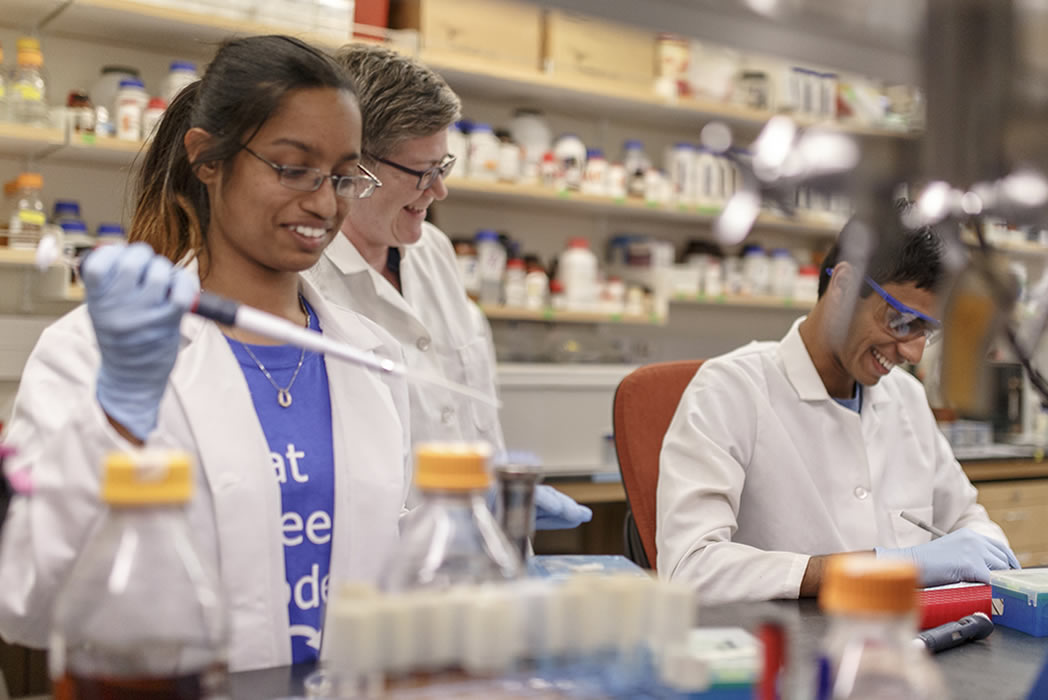
To point more girls and people of color toward careers in science, technology, engineering and mathematics, Texas House Representative Rhetta Bowers helped pass House Bill 3435 last year, officially designating March 1 as Texas Girls in STEM Day.
“When asked why this effort means so much to me, I often reply, ‘because tomorrow depends on us,’” Bowers said recently.
Marking the anniversary of the bill’s passage, Bowers hosted a virtual celebration of women and girls in STEM on March 1. Among her panelists was Dr. Mary Urquhart, associate professor and Science and Mathematics Education Department head in the School of Natural Sciences and Mathematics at UT Dallas.
“Highlighting women in STEM is incredibly important,” Dr. Urquhart said. “Science and other STEM fields emerge from a human passion and approach to the world that have had tremendous impacts on society as a whole. That spark is something innate to our species that can be nurtured in anyone, regardless of gender, race, culture, or background,” she said.
This longtime leader and advocate of STEM also directs UTeach Dallas, a secondary STEM-teacher-preparation program that allows UT Dallas students majoring in STEM fields to combine their degree with secondary teaching certification without adding time or cost.
“The Master of Arts in Teaching programs have graduated hundreds of in-service teachers since I first came to UTD. UTeach Dallas has produced about 260 graduates with teaching certification since our first graduates in 2011, and outreach programs in the department have served hundreds more.”
–Dr. Mary Urquhart
When Dr. Urquhart started teaching at UT Dallas in the spring of 2003, she was the only female professor teaching physics.
“Two female physics graduate students came to me that semester and asked me to be the faculty advisor for a new Women in Physics student group. The focus of the group was to do outreach to encourage girls to go into physics, and we decided on a camp for girls in middle school as our main activity,” Dr. Urquhart said.
“Young children, girls and boys alike, tend to love science. For girls, interest in the physical sciences starts to lessen in upper elementary and middle school, often because such interests are perceived to be boyish.”
The camp allows girls to celebrate and expand their interest in science at a time when they feel external pressures to leave such interests behind.
The camps also offer a valuable educational outreach opportunity for students preparing to be teachers.
“Before COVID, we had a UTD student-run regular camp for rising 7th and 8th graders, and an advanced camp for returning campers. Alumni of the advanced camp then would return to volunteer as peer-leaders. My hope is that once the pandemic is passed, we will return again to this model,” she said.
According to a 2018 report from the Pew Research Center, which tracks social and demographic trends, Blacks and Hispanics are underrepresented in science, technology, engineering and math jobs, relative to their presence in the overall U.S. workforce, particularly among workers with a bachelor’s degree or higher.
Another Pew study found that for women working in STEM jobs, the workplace is a different, sometimes more hostile environment than the one their male coworkers experience.
“While women have made tremendous strides in STEM fields over my lifetime,” Urquhart said, “in the Seventies it was incredibly difficult for a woman to be accepted in any STEM profession. And as I have told my own daughter many times, it keeps getting better but there is a long way still to go,” Dr. Urquhart said.
Dr. Urquhart said she was fortunate to have female scientists as mentors during her own education.
“These women were the rare exceptions in a world that had long been dominated by men. When I was in undergraduate and graduate school, women in physics were rare. Though percentages of women in physics and many other STEM fields have improved the past 25 years, they remain far from representative of the general population,” she said.
Dr. Urquhart said she gains tremendous satisfaction sharing science with others.
“Inspiring and nurturing a love of science in others and helping teachers do the same with their own students in science and mathematics is a calling for me. Working with teachers is especially important in making an impact.”
From the legislative side, Bowers concurs.
“I am happy to have worked to pass a bill that created Texas Girls in STEM Day celebrated annually on March 1. And I am proud that this day will forever be a special day in our great state for girls in STEM. I’m excited to see how having this day will encourage girls to think big and aim high,” Bowers said.
Bowers’ district includes parts of Rowlett, Dallas, Sunnyvale, Mesquite, Garland, Seagoville, Balch Springs and Combine.
Help us leave the planet a better place for future generations. Your support for the School of Natural Sciences and Mathematics funds scientific discoveries with real-world applications, student and faculty recruitment, and academic scholarships.